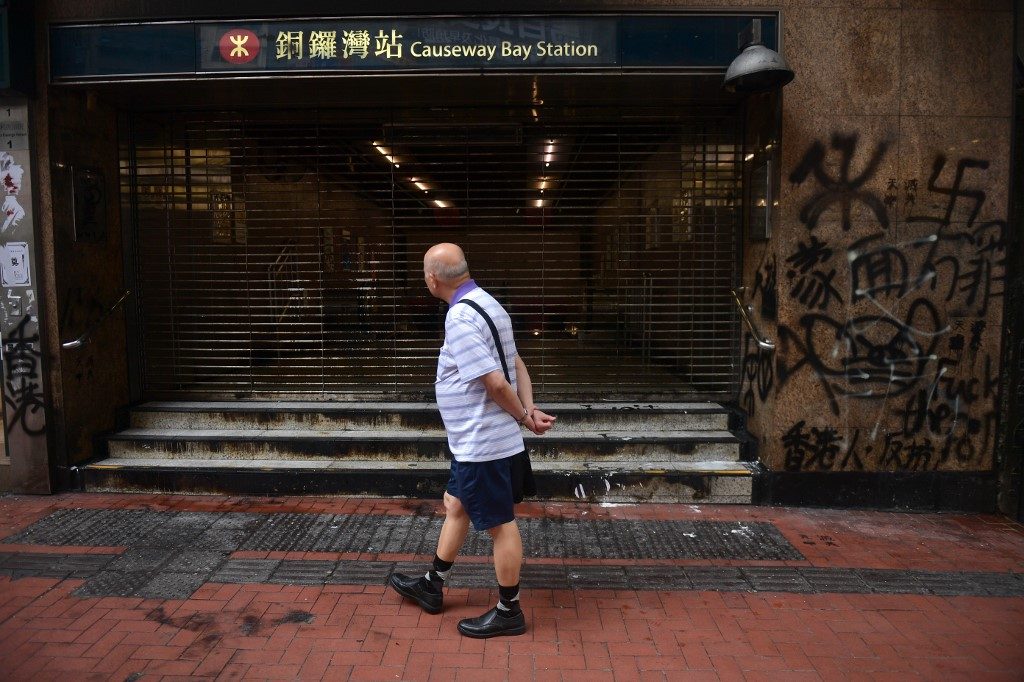SUMMARY
This is AI generated summarization, which may have errors. For context, always refer to the full article.

HONG KONG, China – Hong Kong’s government may curb access to the internet in a bid to contain months of increasingly violent pro-democracy protests, a cabinet member told Agence France-Presse (AFP) on Monday, October 7, after an emergency-law ban on demonstrators wearing face masks failed to quell the unrest.
The warning came as the international financial hub remained partly paralyzed from 3 days of protests in which the city’s rail network and business outlets seen as pro-China were badly vandalized.
The surge in protests was in response to the Hong Kong government’s announcement on Friday, October 4, it would invoke colonial-era emergency laws not used for more than 50 years to ban demonstrators from wearing face masks.
Chief Executive Carrie Lam said the ban was needed to contain the unrest, which began nearly 4 months ago and has seen millions of people take to the streets demanding China stop strangling their freedoms.
Ip Kwok-him, a veteran pro-Beijing politician and member of Hong Kong’s executive council, fueled those concerns when he said controls on the internet could be introduced.
“The government will not rule out the possibility of placing a ban on the internet,” he told AFP.
Ip said the internet has been crucial to protesters, who have no public leaders and use online forums and encrypted messaging apps to mobilize.
But he said the government recognized any online shutdown could have a knock-on effect.
“I think a condition for implementing the Internet ban would be not to affect any businesses in Hong Kong,” he said.
The executive council is Hong Kong’s cabinet, an advisory body to Lam.
She announced the ban on face masks immediately after meeting with the council on Friday.
First mask arrests in court
On Monday morning, a male university student and a 38-year-old woman were the first people to be charged with illegally wearing masks as supporters packed the courtroom – many wearing face coverings.
They were charged with unlawful assembly, which carries up to 3 years jail time, and with defying the mask ban, which has a maximum one-year sentence. Both were released on bail.
Outside the court, demonstrators queued to get in, some chanting slogans such as “Wearing a face mask isn’t a crime” and “The law is unjust.”
Many said they feared the mask ban was just the first of more emergency orders to come.
“It’s an excuse to just introduce other totalitarian laws, next is martial law,” one protester outside the court, who gave his surname Lo, told AFP.
Few concessions
The protests were ignited by a now-scrapped plan to allow extraditions of criminal suspects to the mainland.
This fuelled fears of an erosion of liberties promised under the 50-year “one country, two systems” model China agreed to ahead of the 1997 handover by Britain.
After Beijing and local leaders took a hard stance to the initial protests, the demonstrations snowballed into a wider movement calling for more democratic freedoms and police accountability.
Lam has refused major concessions, but struggled to come up with any political solution.
The past week has seen a particularly intense stretch of protests.
The worst clashes to date erupted on Tuesday, October 1, as China celebrated 70 years of Communist Party rule, with a teenager shot and wounded by police as he attacked an officer.
Over the weekend largely peaceful flash mob rallies and marches featured people wearing masks.
But more hardcore protesters also went on the rampage, trashing subway stations, ransacking government offices and vandalizing businesses with mainland ties.
Large parts of the railway network closed over the weekend because of the vandalism, while many shops and malls were shuttered. Some subways stations and shops remained closed on Monday, a public holiday in Hong Kong.
Unsanctioned gatherings of masked protesters took place at multiple malls across the city on Monday afternoon with police firing brief volleys of tear gas in the district of Mongkok.
On the mainland, Beijing flexed its muscles by pulling a top US basketball team’s games from state broadcaster CCTV after its manager posted a tweet featuring the message “Fight for Freedom. Stand with Hong Kong.”
The Houston Rockets tried to calm the waters, issuing apologies from players and the manager. – Rappler.com
Add a comment
How does this make you feel?
There are no comments yet. Add your comment to start the conversation.